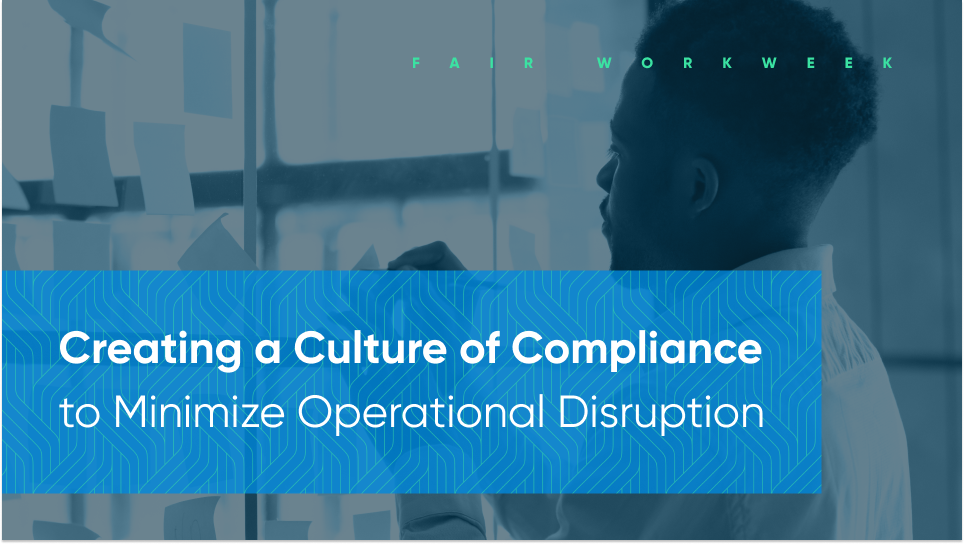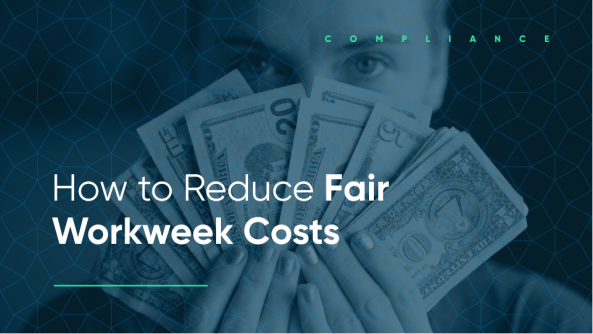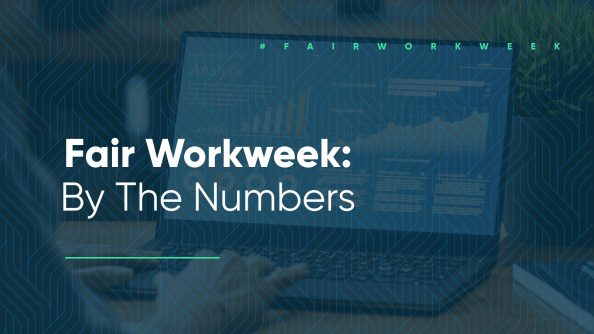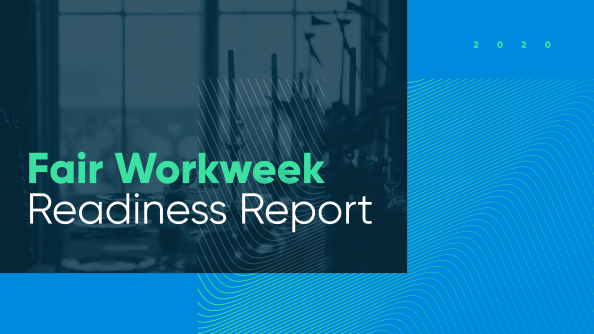Creating a Culture of Compliance to Minimize Operational Disruption

- By Harri Insider Team | November 5, 2021
Initiatives for the Fair Workweek are on the rise across the country. Currently, they vary mostly from city to city in larger metropolitan areas like New York, San Francisco, Philadelphia, and Seattle, though state-wide initiatives are not off the table as we see in Oregon.
As these new labor laws gain traction, it’s only a matter of time that more and more cities and states will follow suit, imposing similar initiatives — which means your own may be next. Connecticut, New Jersey, and Los Angeles are already considering implementing predictive scheduling laws.
For restaurant operators, it’s best to understand and prepare for those changes now, as it looks like they may be here for the long haul.
Why was Fair Workweek created?
Also known as Predictive Scheduling laws, the Fair Workweek aims to help part-time, hourly workers who have often been left behind on initiatives to establish beneficial conditions in favor of the worker.
Among other things, this includes consistent schedules with predictability, the kind that enables more stability for life outside of work. In many cases, the lack of such reliable scheduling not only costs workers time, but money as well.
Imagine the single parent attempting to coordinate childcare around an ever-changing schedule. Consider that scenario as said parent tries planning for an on-call shift, spending money to make money but without certainty of actually earning any income. Or even beyond an on-call shift, the same single parent makes all arrangements to head into work only to be cut early for the myriad of reasons that affect business in the hospitality world.
It’s hard to argue against the need for change considering such scenarios are less hypothetical than frequent realities.
As such, components of Fair Workweek aim to provide similar conditions to hourly employees that many salaried workers already enjoy.
Compliance may be difficult, but it certainly is rooted in good intentions. As such, compliance tends to result in higher retention, but we’ll cover more on that later.
While specific Fair Workweek compliance details vary by jurisdiction, you can expect many of the following tenets:
1. Advanced notice scheduling
A large basis for Predictive Scheduling requires, as you may have guessed, the release of schedules well in advance. Typically employers are required to provide workers with a schedule at least 14 days before the work week in question, via electronic distribution.
While these advanced notice schedules are supposed to be set in stone, they can be adjusted. However, any employer-driven changes to an already- posted schedule will incur penalties in the form of premium payments.
Are there exceptions to these advanced notice premium payments? A few.
If an employee initiates a schedule change, such as if they request to swap shifts with another team member or call in sick, the employer will not be penalized.
2. Good faith estimates of employee hours
Most applicable to new hires, the good faith estimate requires an employer to provide employees with estimates for expectations of hours to be worked each month.
That includes expected day of work, expected shift times, and approximately how many hours an employee can expect to work each week.
The employee’s schedule doesn’t have to mirror the good faith estimate perfectly, but if it varies significantly over an extended period of time, employers will need to adjust the good faith estimate to reflect new scheduling trends.
Considering so many part-time hourly workers are balancing multiple schedules from additional jobs, school, or creative pursuits, an understanding of expected hours is highly beneficial, not only to the worker, but the employer as well.
Note that some jurisdictions require this more frequently, for example around the holidays or when any significant changes to an employee’s schedule are expected.
3. Access to hours
Speaking of holidays, as extra shifts become available, like when the holidays roll around or an employee leaves the company, such additional hours are to be made known and available to existing employees before bringing in new hires.
Under Fair Workweek, part-time employees looking to go full-time should always have priority over hiring new staff.
4. Right to rest periods
Similar to labor laws already in place in sectors like the airline industry, where flight attendants are required a certain number of hours for rest between flights, stricter rest laws in this case address ‘clopening’ shifts (working a closing shift followed by the opening shift the next day).
Depending on the state, the required window can vary.
Oregon, for example, requires at least a 10-hour window. And if a ‘clopening’ shift should occur, it may cost the employer anywhere from an extra $100 to 1.5x their hourly rate.
5. The right to scheduling requests
Quite simply, employees are allowed to provide input on their schedules. Now, this doesn’t obligate an employer to accommodate every request, but the right to initiate these requests without threat of retaliation is nonetheless required.
However, making the effort towards honoring requests whenever possible does contribute to a positive work culture.
And remember, a happy employee often translates into a positive guest experience!
6. Volunteer standby lists: an end to on-call shifts
The majority of these Fair Workweek initiatives put an end to on-call shifts, something many establishments have come to rely on as a backup for an unexpected rush of customers or last-minute employee call-outs.
Not to worry though, some Fair Workweek jurisdictions allow an alternative to fill their spot: the standby list.
Standby list allows available and willing employees to volunteer to be called into work on a given day, should the need arise. ‘Volunteer’ being the operative word here, as managers and employers must steer clear from pressuring any employee to put their name on the list.
7. Posting Fair Workweek rules
This one is pretty straight forward. The simplest requirement of this law is posting Fair Workweek rules around the workplace, such as posters in the break room or online resources. This includes different languages if multiple languages are spoken among your staff.
Employees need to be informed of their rights and the subsequent premium payments owed to them in case of infringement.
The approach: creating a culture of compliance
Fair Workweek compliance may seem like a lot to take in and certainly a lot to remember, both at the corporate level and for unit-level managers. It might seem like a lot of administrative and a lot of potential added operational costs.
With the right tools, it doesn’t have to be. Compliance software can empower operators to minimize time lost and keep extra costs down.
So what are the best strategies to take on these changes?
Enable transparency across your teams
Though posting Fair Workweek rules around the workplace is required, it’s not enough to just hang these notices on the wall.
Proactively reminding employees of their rights and when they’re entitled to premium payments is critical to establishing trust between employees and your brand. And when your frontline workers trust your brand, they’re less likely to feel slightly if a manager accidentally forgets to issue a premium payment, significantly decreasing the risk of that employee filing a non-compliant complaint.
Avoiding non-compliant complaints is critical for a number of reasons.
Even if the employee is mistaken, an investigation could lead to auditors digging deep into your records. That’s a lot of administrative burden onto your store manager.
Then, if anything has slipped through the cracks, you’re left wide open to subsequent lawsuits for neglecting to keep up with such laws.
Staying on top of premium payments is a lot less expensive than lawsuits down the line for letting those unpaid penalties accumulate. In the case of major QSR brands violating Fair Workweek laws, we’re talking savings by the millions.
Automation Fair Workweek-related compensation is a great way to avoid this, and naturally build a culture of compliance within your brand. Payment automation ensures complete compliance accuracy without requiring managers to become legal experts on top of their already-busy daily responsibilities.
And when your employees know that they’ll receive their required premium payments on time, no questions asked, their employee experience is significantly improved.
We build Fair Workweek compliance directly into our scheduling platform and timeclock tools. While we’ll cover the labor portion of that below, it also means that employees are automatically issued earned compliance-related payments each pay period based on real-time shift information.
The result? A lot of time (and stress) saved for busy managers.
Compliance-driven scheduling
Streamlining your scheduling practices allows managers and employers to stay on top of predictive scheduling. One of the best ways to maintain this is by utilizing analytics intended to provide the most accurate idea possible about labor needs.
For example, incorporating historical sales data into scheduling needs helps managers reduce the risk of last-minute call-ins — AKA violating the “predictive scheduling” aspect of Fair Workweek.
The more you understand potential customer demand, the smarter and more compliant your scheduling practices can be. Scheduling software is a must-have here to perform the analytics for your managers.
Our intelligent scheduling platform incorporates all of the above, including other critical data points like labor spend restrictions per week, employee shift availability, shift preferences, shift requests, and more. And yes, it can handle employee-to-employee shift swaps.
All of this is designed to cut down the amount of time your team spends building compliant schedules.
Managers are empowered to make smarter scheduling decisions and seamlessly integrate Fair Workweek compliance into daily operations. Employees can rest assured that their scheduling needs are taken into consideration.
Track penalties with non-compliance alerts
This is a big one. Can you imagine the administrative nightmare if one person was keeping track of all possible infractions on their own? Hospitality has a tendency to pass information from person to person via a “game of telephone,” or word of mouth. Things like last-minute schedule changes, including employee-driven shift swaps, are often communicated verbally.
That’s a potential legal disaster for a one-store business, let alone for managers overseeing hundreds of employees and dozens of locations.
An integrated system that monitors penalties and sends alerts real-team saves an immense amount of time (and of course, money).
Our Fair Workweek compliance alerts consider compliance requirements at the federal and local levels to prevent potential compliance violations, then pull a full audit of non-compliant actions taken by managers.
Imagine receiving alerts when:
- A schedule change will incur a premium payment
- Good faith documentation must be updated or renewed
- An advanced notice scheduling period is approaching
- An employee’s shift violates right to rest laws
That sort of information makes it incredibly easy for managers to enforce a culture of compliance by eliminating the unknowns of Fair Workweek operations. Knowledge is power!
On the auditing end of things, your team has full access to pull a record of all compliance-related actions and payments.
Fair Workweek compliance audits include:
- What the non-compliant action was
- When the non-compliant action happened
- Who approved it
- The date of the approval
- What employee(s) were affected
- Premium payments issued as a result
That’s critical information in the face of an audit, generated in moments across all employees and store locations. For operators seeking to optimize labor operations (who isn’t), Fair Workweek audits also serve as a great guide to understand your brand’s biggest compliance gaps.
Voluntary standby and employee requests
It’s pretty easy to understand the advantages of a volunteer standby list over mandatory on-call shifts, as eliminating on-calls directly correlates to employee morale.
Even on nights when business is slow, leaving the option up to staff members to request the day off, or to leave early, puts more of the power in their hands.
There’s always someone who would rather have the night off (or leave early) if given the opportunity. If the employee themself requests a schedule change, then no penalty pay is required of the employer.
We enable voluntary opt-in lists for Fair Workweek jurisdictions where this feature is allowed. Employees can opt into and out of the standby list as often as they’d like, and Harri adjusts their scheduling availability automatically. Speaking of schedules, we also make shift-swap requests incredibly easy so managers can approve shift changes that won’t incur premium payments.
Make Fair Workweek laws work for you
We all know that hospitality is an industry notorious for unreliable schedules. A lack of predictability is common considering numerous factors affect how operations run: holidays, events, changes in weather, call-outs, to name a few.
Though Fair Workweek laws may seem daunting at first, they simply require reframing how you approach scheduling. It’s important to cultivate a culture of compliance and incorporate the right tools to help your team succeed.
It’s a process of reacclimating, but one that can benefit both parties in the end. Studies reflect that predictable, stable schedules can actually improve sales and decrease work-related stress for the employee.
And we all know happy employees translate into happy customers. Even if Fair Workweek isn’t affecting your city or state just yet, considering a slow approach to compliance can do wonders for team retention. Not to mention it will make the transition easier if the laws ever do come into effect — and trust us, they are spreading quickly.
Learn how our end-to-end Fair Workweek compliance tools can elevate your business’ labor operators.




















